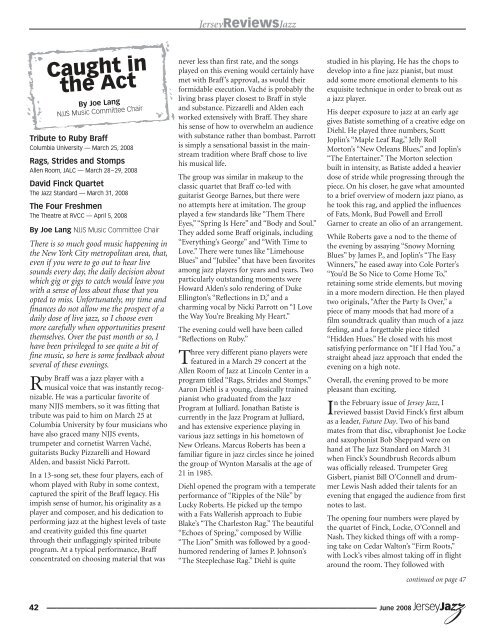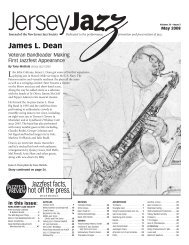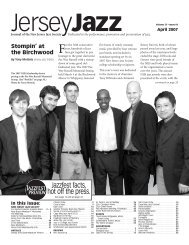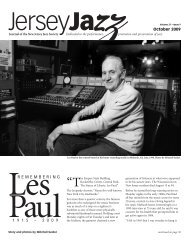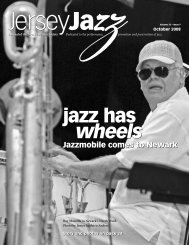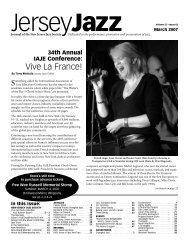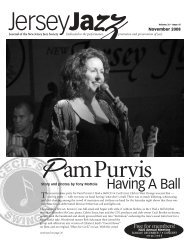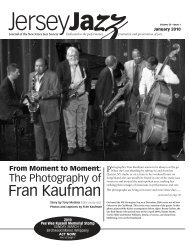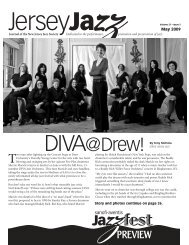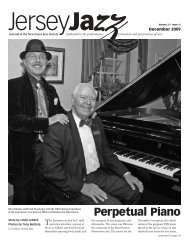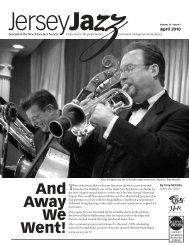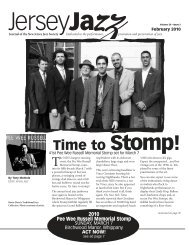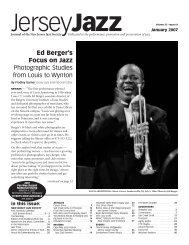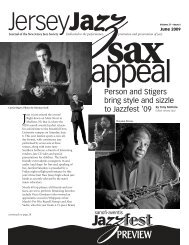Herman Leonard's Stolen Moments June 6,7,8 - New Jersey Jazz ...
Herman Leonard's Stolen Moments June 6,7,8 - New Jersey Jazz ...
Herman Leonard's Stolen Moments June 6,7,8 - New Jersey Jazz ...
You also want an ePaper? Increase the reach of your titles
YUMPU automatically turns print PDFs into web optimized ePapers that Google loves.
Caught in<br />
the Act<br />
By Joe Lang<br />
NJJS Music Committee Chair<br />
Tribute to Ruby Braff<br />
Columbia University — March 25, 2008<br />
Rags, Strides and Stomps<br />
Allen Room, JALC — March 28–29, 2008<br />
David Finck Quartet<br />
The <strong>Jazz</strong> Standard — March 31, 2008<br />
The Four Freshmen<br />
The Theatre at RVCC — April 5, 2008<br />
By Joe Lang NJJS Music Committee Chair<br />
There is so much good music happening in<br />
the <strong>New</strong> York City metropolitan area, that,<br />
even if you were to go out to hear live<br />
sounds every day, the daily decision about<br />
which gig or gigs to catch would leave you<br />
with a sense of loss about those that you<br />
opted to miss. Unfortunately, my time and<br />
finances do not allow me the prospect of a<br />
daily dose of live jazz, so I choose even<br />
more carefully when opportunities present<br />
themselves. Over the past month or so, I<br />
have been privileged to see quite a bit of<br />
fine music, so here is some feedback about<br />
several of these evenings.<br />
Ruby Braff was a jazz player with a<br />
musical voice that was instantly recognizable.<br />
He was a particular favorite of<br />
many NJJS members, so it was fitting that<br />
tribute was paid to him on March 25 at<br />
Columbia University by four musicians who<br />
have also graced many NJJS events,<br />
trumpeter and cornetist Warren Vaché,<br />
guitarists Bucky Pizzarelli and Howard<br />
Alden, and bassist Nicki Parrott.<br />
In a 13-song set, these four players, each of<br />
whom played with Ruby in some context,<br />
captured the spirit of the Braff legacy. His<br />
impish sense of humor, his originality as a<br />
player and composer, and his dedication to<br />
performing jazz at the highest levels of taste<br />
and creativity guided this fine quartet<br />
through their unflaggingly spirited tribute<br />
program. At a typical performance, Braff<br />
concentrated on choosing material that was<br />
<strong>Jersey</strong>Reviews<strong>Jazz</strong><br />
never less than first rate, and the songs<br />
played on this evening would certainly have<br />
met with Braff’s approval, as would their<br />
formidable execution. Vaché is probably the<br />
living brass player closest to Braff in style<br />
and substance. Pizzarelli and Alden each<br />
worked extensively with Braff. They share<br />
his sense of how to overwhelm an audience<br />
with substance rather than bombast. Parrott<br />
is simply a sensational bassist in the mainstream<br />
tradition where Braff chose to live<br />
his musical life.<br />
The group was similar in makeup to the<br />
classic quartet that Braff co-led with<br />
guitarist George Barnes, but there were<br />
no attempts here at imitation. The group<br />
played a few standards like “Them There<br />
Eyes,” “Spring Is Here” and “Body and Soul.”<br />
They added some Braff originals, including<br />
“Everything’s George” and “With Time to<br />
Love.” There were tunes like “Limehouse<br />
Blues” and “Jubilee” that have been favorites<br />
among jazz players for years and years. Two<br />
particularly outstanding moments were<br />
Howard Alden’s solo rendering of Duke<br />
Ellington’s “Reflections in D,” and a<br />
charming vocal by Nicki Parrott on “I Love<br />
the Way You’re Breaking My Heart.”<br />
The evening could well have been called<br />
“Reflections on Ruby.”<br />
Three very different piano players were<br />
featured in a March 29 concert at the<br />
Allen Room of <strong>Jazz</strong> at Lincoln Center in a<br />
program titled “Rags, Strides and Stomps.”<br />
Aaron Diehl is a young, classically trained<br />
pianist who graduated from the <strong>Jazz</strong><br />
Program at Julliard. Jonathan Batiste is<br />
currently in the <strong>Jazz</strong> Program at Julliard,<br />
and has extensive experience playing in<br />
various jazz settings in his hometown of<br />
<strong>New</strong> Orleans. Marcus Roberts has been a<br />
familiar figure in jazz circles since he joined<br />
the group of Wynton Marsalis at the age of<br />
21 in 1985.<br />
Diehl opened the program with a temperate<br />
performance of “Ripples of the Nile” by<br />
Lucky Roberts. He picked up the tempo<br />
with a Fats Wallerish approach to Eubie<br />
Blake’s “The Charleston Rag.” The beautiful<br />
“Echoes of Spring,” composed by Willie<br />
“The Lion” Smith was followed by a goodhumored<br />
rendering of James P. Johnson’s<br />
“The Steeplechase Rag.” Diehl is quite<br />
studied in his playing. He has the chops to<br />
develop into a fine jazz pianist, but must<br />
add some more emotional elements to his<br />
exquisite technique in order to break out as<br />
a jazz player.<br />
His deeper exposure to jazz at an early age<br />
gives Batiste something of a creative edge on<br />
Diehl. He played three numbers, Scott<br />
Joplin’s “Maple Leaf Rag,” Jelly Roll<br />
Morton’s “<strong>New</strong> Orleans Blues,” and Joplin’s<br />
“The Entertainer.” The Morton selection<br />
built in intensity, as Batiste added a heavier<br />
dose of stride while progressing through the<br />
piece. On his closer, he gave what amounted<br />
to a brief overview of modern jazz piano, as<br />
he took this rag, and applied the influences<br />
of Fats, Monk, Bud Powell and Erroll<br />
Garner to create an olio of an arrangement.<br />
While Roberts gave a nod to the theme of<br />
the evening by assaying “Snowy Morning<br />
Blues” by James P., and Joplin’s “The Easy<br />
Winners,” he eased away into Cole Porter’s<br />
“You’d Be So Nice to Come Home To,”<br />
retaining some stride elements, but moving<br />
in a more modern direction. He then played<br />
two originals, “After the Party Is Over,” a<br />
piece of many moods that had more of a<br />
film soundtrack quality than much of a jazz<br />
feeling, and a forgettable piece titled<br />
“Hidden Hues.” He closed with his most<br />
satisfying performance on “If I Had You,” a<br />
straight ahead jazz approach that ended the<br />
evening on a high note.<br />
Overall, the evening proved to be more<br />
pleasant than exciting.<br />
In the February issue of <strong>Jersey</strong> <strong>Jazz</strong>, I<br />
reviewed bassist David Finck’s first album<br />
as a leader, Future Day. Two of his band<br />
mates from that disc, vibraphonist Joe Locke<br />
and saxophonist Bob Sheppard were on<br />
hand at The <strong>Jazz</strong> Standard on March 31<br />
when Finck’s Soundbrush Records album<br />
was officially released. Trumpeter Greg<br />
Gisbert, pianist Bill O’Connell and drummer<br />
Lewis Nash added their talents for an<br />
evening that engaged the audience from first<br />
notes to last.<br />
The opening four numbers were played by<br />
the quartet of Finck, Locke, O’Connell and<br />
Nash. They kicked things off with a romping<br />
take on Cedar Walton’s “Firm Roots,”<br />
with Lock’s vibes almost taking off in flight<br />
around the room. They followed with<br />
42 __________________________________ <strong>June</strong> 2008<br />
continued on page 47


